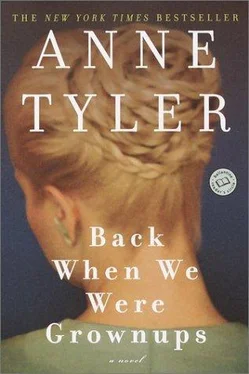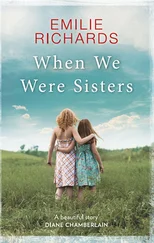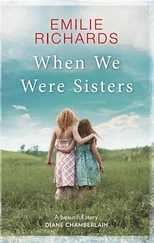“Besides, I don’t even like dogs.”
“Then you certainly don’t want one.”
“They bark at night, and chew things.”
“Rebecca. Forget the dog.”
“But how will I make friends, then?” she asked him. She knew she was being ridiculous, but she couldn’t seem to drop the subject once she’d gotten hold of it. “I’m not good at starting conversations with some stranger on the street.”
“You could just walk around with a leash and an empty collar.”
“What? How would that help?”
“You’d see someone and she’d ask, ‘Excuse me, where’s your dog?’ And you’d say, ‘Oh, no! My dog! I must have lost him! Could you please help me look for him?’”
“Then the two of us could go on walking, getting to know each other—”
“You’d have to be careful, though, not to let that person catch you doing the same thing to someone else the next day. She’d spot you up ahead of her, you’d be dragging your empty collar, you’d be saying to someone new, ‘Oh, no! My dog! I must have lost him!’”
By now Rebecca had the giggles, and Zeb was laughing too.
Eventually, though, she said, “Well.” She sighed. “I should let you sleep. I’ll check with you again as soon as I figure out when I can leave.”
“Any time,” Zeb told her.
Then they said good night, and she hung up and lay back on her pillow.
The best way to travel to Church Valley was by car. Although it was possible, too, to take a bus. She could do that if she didn’t mind a transfer. What was not possible was a train, but somehow, even so, she pictured going by train. She pictured sitting in an aisle seat, next to the son who would have been hers if only she had continued with the life she had begun.
As soon as I sort my belongings I’m moving to a retirement home,” Rebecca’s mother said. “I already know which one. It’s just that I need to get my belongings sorted first.”
They were sitting in Rebecca’s mother’s living room — Rebecca in an armchair, her mother on the couch. Her mother wore her usual outfit of pastel polyester top and dark, skinny knit slacks with the creases stitched down the front. She was eighty-seven years old — a little cornhusk doll, straw-colored and drily rustling. Rebecca had outweighed her since late childhood, but she had always considered her to be a sturdy woman. It came as a shock to picture her in a retirement home. “What’s made you think of moving?” she asked. “Are you having any health problems?”
“No, not a one. But Church Valley isn’t like when you lived here, Rebecca. After they built that mall out where the duck farm used to be, why, seems we just got hollow at the center. Downtown isn’t even downtown anymore. So I signed up for a unit at Havenhurst, but I don’t know when I’ll get to go there with all these belongings to sort.”
Rebecca glanced around her. She didn’t see any evidence that her mother had started yet. Not that there was much to do — this was a small house, fastidiously tidy — but every object had the glued-down appearance of something that had stayed in the same position for decades. Two hurricane lamps were spaced symmetrically on the mantel, an Oriental vase was centered in the front window, and the table at Rebecca’s elbow bore a shrinelike arrangement of three gilt-framed photos, a candy dish, and a bowl of faded silk flowers. If she were to pick up, say, her parents’ wedding photo and set it down again, she knew her mother would be over in two seconds to readjust its location by a fraction of an inch.
“Maybe I could help,” she said.
“Oh, no, thank you,” her mother said. “I won’t forget what happened when your Aunt Ida tried to help. It took me days to undo what she’d done! And some things I could never undo. For instance, she threw away an entire sheet of postage stamps; three-cent postage stamps. I wasn’t aware of it at the time because I was out of the room, fixing her a snack. That’s how it is when people try to help: they need snacks and cups of tea, and before you know it you’ve gone to more trouble than if they’d stayed at home. I brought out a plate of those peppermint patties that she’s always been so fond of, and then she told me she was on a diet. I said, ‘What do you mean, a diet? I’ve been nagging you all your life to diet and it didn’t do the least bit of good; so why would you take it into your head now that you’re in your eighties?’ And Ida said—“
“But the stamps…” Rebecca prodded her. Then she wondered why she’d bothered, since even the stamps were not the point of the conversation.
“The thing is, I didn’t know she’d thrown them out. There I was in the kitchen, waiting on her hand and foot, and meanwhile Ida was in the living room merrily discarding my stamps. When I went to look for them later in the week, I couldn’t find them. I phoned her. I said, ‘Ida, what did you do with those stamps?’ ‘What stamps?’ she asked, innocent as an angel. ‘That sheet of stamps in my desk drawer,’ I said. ‘There’s not a thing in that drawer now but dried-up ballpoint pens with advertising on them.’ And Ida said, ‘I hope I didn’t throw them away.’ ‘Throw them away!’ I told her.”
Rebecca said, “Well, luckily they were—”
“I said, ‘ Where did you throw them away?’ and she said, ‘Now I’m not saying for certain that I did, you understand.’ ‘Where?’ I said, and she said, ‘The recycling sack under the sink, maybe?’ I said, ‘No.’ I said, ‘You didn’t.’ I said, ‘You couldn’t have.’ Because I’d gotten rid of that sack on paper collection day.”
“Luckily,” Rebecca said, “they were only three-cent stamps.”
“A hundred three-cent stamps, might I add. What we’re saying is, my sister threw away three dollars. And I told her as much. ‘Fine, I’ll pay you back,’ she said. ‘Next time I come over to visit, I’ll bring three dollar bills.’ Which is so exactly like her, isn’t it? I said, ‘Now, what on earth will that accomplish? You’d still have wasted three dollars, and all for nothing. We might as well have burned it; that money’s simply gone. Turned to paper soup in the recycling plant.’”
Rebecca started jiggling one foot.
“So I’ll just do my sorting on my own,” her mother told her. “Never let it be said that I’m unable to learn from experience.”
And she tucked her chin in modestly and gazed down at her lap, while Rebecca recrossed her legs and started jiggling the other foot.
* * *
It had taken her more than a month to find the time for this trip, and now they were in the full bloom of summer — a Thursday in mid-July. When they set out on a walk to Ida’s after lunch, the town appeared to be liquefied by the heat, all wavery and smeared like something behind antique window glass. The clay path leading down to the river was baked as hard as linoleum, and the footbridge’s black metal railing burned Rebecca’s hand. The river itself — wide but shallow, pebble-bottomed — seemed sluggish and exhausted, its sound less a rush than a series of slow glugs. Rebecca paused halfway across to study it. “The funniest thing,” she told her mother. “Lately, I’ve started loving rivers.”
“Loving them!”
“I’ve always liked them, of course; but I look at a river now and it just satisfies my eyes, you know? It seems to me so… old-fashioned.”
“Maybe you should move back here, then.”
“Well…”
“Why not? The girls are grown; you’ve got no responsibilities.”
“Only the Open Arms,” Rebecca said.
“The what? Oh, the Open Arms. Well, that’s the Davitches’ business; not yours.”
Читать дальше












